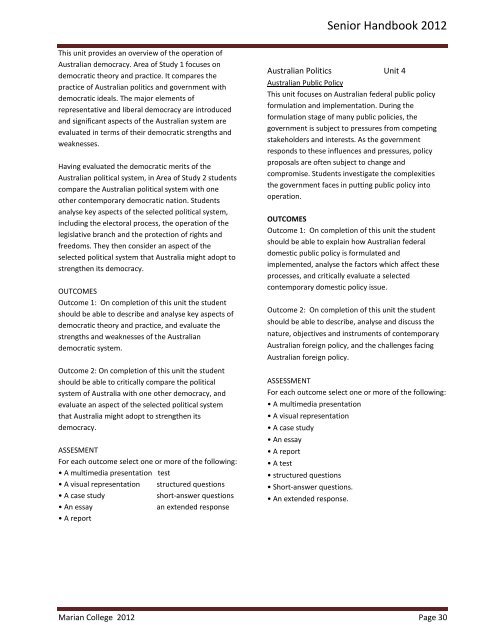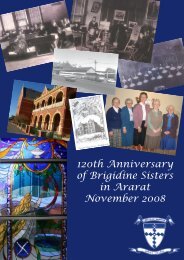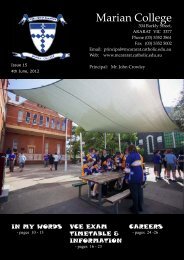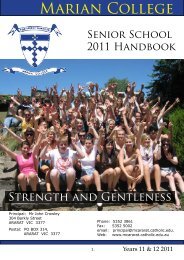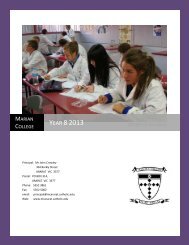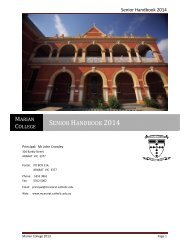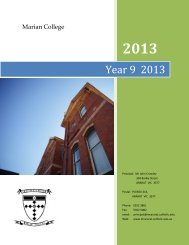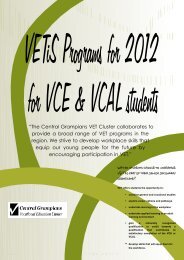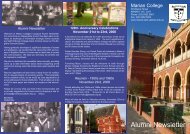Senior Handbook 2012 - Marian College
Senior Handbook 2012 - Marian College
Senior Handbook 2012 - Marian College
You also want an ePaper? Increase the reach of your titles
YUMPU automatically turns print PDFs into web optimized ePapers that Google loves.
<strong>Senior</strong> <strong>Handbook</strong> <strong>2012</strong><br />
This unit provides an overview of the operation of<br />
Australian democracy. Area of Study 1 focuses on<br />
democratic theory and practice. It compares the<br />
practice of Australian politics and government with<br />
democratic ideals. The major elements of<br />
representative and liberal democracy are introduced<br />
and significant aspects of the Australian system are<br />
evaluated in terms of their democratic strengths and<br />
weaknesses.<br />
Having evaluated the democratic merits of the<br />
Australian political system, in Area of Study 2 students<br />
compare the Australian political system with one<br />
other contemporary democratic nation. Students<br />
analyse key aspects of the selected political system,<br />
including the electoral process, the operation of the<br />
legislative branch and the protection of rights and<br />
freedoms. They then consider an aspect of the<br />
selected political system that Australia might adopt to<br />
strengthen its democracy.<br />
OUTCOMES<br />
Outcome 1: On completion of this unit the student<br />
should be able to describe and analyse key aspects of<br />
democratic theory and practice, and evaluate the<br />
strengths and weaknesses of the Australian<br />
democratic system.<br />
Outcome 2: On completion of this unit the student<br />
should be able to critically compare the political<br />
system of Australia with one other democracy, and<br />
evaluate an aspect of the selected political system<br />
that Australia might adopt to strengthen its<br />
democracy.<br />
ASSESMENT<br />
For each outcome select one or more of the following:<br />
• A multimedia presentation test<br />
• A visual representation structured questions<br />
• A case study<br />
short-answer questions<br />
• An essay<br />
an extended response<br />
• A report<br />
Australian Politics Unit 4<br />
Australian Public Policy<br />
This unit focuses on Australian federal public policy<br />
formulation and implementation. During the<br />
formulation stage of many public policies, the<br />
government is subject to pressures from competing<br />
stakeholders and interests. As the government<br />
responds to these influences and pressures, policy<br />
proposals are often subject to change and<br />
compromise. Students investigate the complexities<br />
the government faces in putting public policy into<br />
operation.<br />
OUTCOMES<br />
Outcome 1: On completion of this unit the student<br />
should be able to explain how Australian federal<br />
domestic public policy is formulated and<br />
implemented, analyse the factors which affect these<br />
processes, and critically evaluate a selected<br />
contemporary domestic policy issue.<br />
Outcome 2: On completion of this unit the student<br />
should be able to describe, analyse and discuss the<br />
nature, objectives and instruments of contemporary<br />
Australian foreign policy, and the challenges facing<br />
Australian foreign policy.<br />
ASSESSMENT<br />
For each outcome select one or more of the following:<br />
• A multimedia presentation<br />
• A visual representation<br />
• A case study<br />
• An essay<br />
• A report<br />
• A test<br />
• structured questions<br />
• Short-answer questions.<br />
• An extended response.<br />
<strong>Marian</strong> <strong>College</strong> <strong>2012</strong> Page 30


